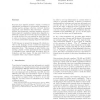743 search results - page 62 / 149 » Realtime garbage collection |
ICFP
1999
ACM
15 years 3 months ago
1999
ACM
Run-time type dispatch enables a variety of advanced optimization techniques for polymorphic languages, including tag-free garbage collection, unboxed function arguments, and fla...
IFL
1999
Springer
15 years 3 months ago
1999
Springer
Abstract. We discuss a new optimisation for recursive functions yielding multiple results in tuples for lazy functional languages, like Clean and Haskell. This optimisation improve...
ICFP
1998
ACM
15 years 3 months ago
1998
ACM
Intensional polymorphism, the ability to dispatch to different routines based on types at run time, enables a variety of advanced implementation techniques for polymorphic languag...
98
Voted
IWMM
1998
Springer
15 years 3 months ago
1998
Springer
Stoye's one-bit reference tagging scheme can be extended to local counts of two or more via two strategies. The first, suited to pure register transactions, is a cache of ref...
63
Voted
PLDI
1990
ACM
15 years 3 months ago
1990
ACM
Languages such as Scheme and Smalltalk that provide continuations as first-class data objects present a challenge to efficient implementation. Allocating activation records in a h...

